 Building a Peaceful Nation
Building a Peaceful Nation 5 - The Origins of Villagization
Published online by Cambridge University Press: 08 May 2021
Summary
TANU Youth League settlement schemes were constantly praised by Nyerere and other government ministers, and their ideological force only continued to increase in official rhetoric. In his inaugural presidential speech on December 10, 1962, Nyerere made reference to “the work being done by the people themselves through self-help schemes” while, ironically, also emphasizing that rural development would be “directly under my control.” Placing the work of these model citizens in a generational framework of family, he told the gathered parliamentarians, “It will be from their children and their grand-children that they will in the end receive the thanks they deserve.” Village development was a major theme of the speech:
The growth of village life will help us in improving our system of democratic government… . Although the methods may be democratic, the operation of democracy itself is not yet what it should be, nor can it be while the majority of our rural population remains so widely scattered… . I intend first to set up a new department: the Department of Development Planning. This Department will be directly under my control, and it will make every effort to prepare plans for village development for the whole country as quickly as possible.
A divisional executive officer in northern Tanganyika used TANU rhetoric to encourage the populace to support “self-help” settlements, “for the sake of fighting our enemy ‘poverty.’” These schemes also served a national security purpose modeled on an optimistic understanding of the moshav settlements in Israel. Nyerere's new Department of Development Planning was an institutional expression of Ujamaa's merging vectors of patriarchal land allocation in local discourse and foreign prescriptions for economic development. The new villages represented not only attempts to enact modernist ideas of development but also pragmatic strategies to secure borders for national defense. Government-directed village settlement was only partly an economic development policy; it was also a locally legible effort to establish sovereignty at the grass roots.
State-directed rural development in Africa has been characterized as an “anti-politics machine” by James Ferguson, who argued that the language of “developmentalism” suppresses political debate and so authorizes unidirectional state action toward rural farmers. James Scott saw villagization as an aspect of a broader disciplinary trend that he called “high modernism,” marked by a Utilitarian inheritance that Michel Foucault identified as panopticism.
- Type
- Chapter
- Information
- Building a Peaceful NationJulius Nyerere and the Establishment of Sovereignty in Tanzania, 1960–1964, pp. 109 - 130Publisher: Boydell & BrewerPrint publication year: 2015


